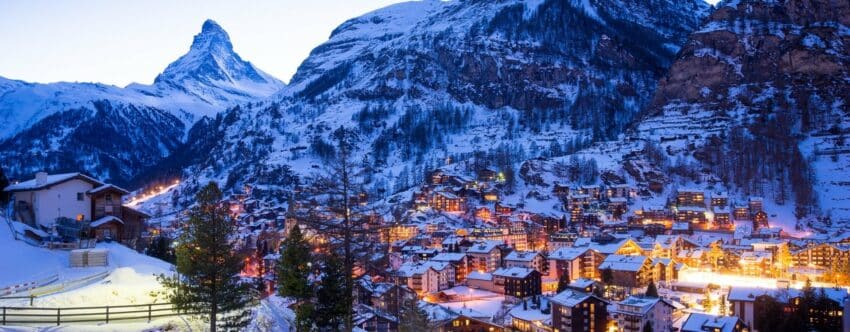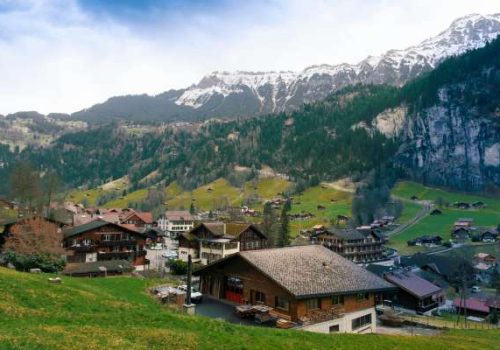Living and Working in Switzerland
Information & guidance about seasonal jobs in Switzerland
Seasonal jobs in Switzerland
- Adventure jobs, Ski & Snowboard Instructor, Ski & Winter Resort, Tourism
- Canada, Japan, New Zealand, Switzerland, United States
Working in Switzerland
Reasons for living and working in Switzerland
At first glance, Switzerland exudes a romantic charm with its harmonious mountain landscapes, lush green meadows dotted with grazing cows, and sparkling crystal-clear lakes. Not to mention, thoughts of delicious chocolate, cheese fondues, pocket knives, and Swiss watches naturally come to mind.
However, upon closer examination, one will discover that the country is incredibly diverse. Nestled in the heart of Europe, Switzerland shares its borders with Germany, France, Italy, Austria, and Liechtenstein. The capital, Bern, stands alongside other prominent cities like Zurich, Basel, Geneva, Lausanne, Lugano, and Lucerne.
These fascinating towns offer a delightful contrast to the many historic villages, where traditional markets and Chilbis (church festivals) take place. Beyond the medieval old towns, one can explore excellent bars, museums, an impressive art scene, and abundant shopping opportunities.
For nature enthusiasts, Switzerland is a haven. The country’s magnificent alpine landscape, adorned with numerous mountain lakes, provides the perfect setting for long hikes. Winter sports enthusiasts also find their paradise here, with easy access to mountains for skiing, snowboarding, tobogganing, or cross-country skiing. With over 200 winter sports areas boasting countless hotels and slopes, the options seem limitless.
Working in Switzerland offers numerous advantages. The Alpine nation boasts a particularly high standard of living and excellent working conditions, partly attributed to the competitive wages. Additionally, income tax and overall taxes are notably lower than those in neighboring countries, making it an appealing destination for many global corporations.
As of 2021, Switzerland’s gross domestic product reached approximately 742.8 billion Swiss francs, positioning the country among the largest economies globally. These compelling factors make Switzerland a prime choice for those seeking a remarkable place to live and work.

Working in Switzerland: Salary and Bank Account
Switzerland not only boasts one of the highest living costs compared to Germany and other European Union countries but also offers some of the most substantial wage levels. The Swiss tend to be discreet about discussing their salaries, possibly to avoid stirring envy, and job advertisements seldom disclose specific wage figures.
Salaries in Switzerland significantly outpace those in Germany. According to the latest statistics, the Swiss enjoy the highest earnings in Europe (excluding Liechtenstein) with an average annual income of around €79,000. When compared to cities like Frankfurt or Berlin, the gross wage levels in Swiss cities such as Basel, Geneva, and particularly Zurich, are 25% to 50% higher on average. If you wish to calculate your net income in Switzerland, a net calculator can assist you in this endeavor.
Negotiations regarding salaries in Switzerland are typically handled on an individual basis between the employee and the Swiss employer. Compensation often takes into account factors such as seniority, and it is not uncommon for Swiss companies to refrain from offering top salaries to young professionals, regardless of their qualifications.
While Switzerland does not have a national minimum wage like many other countries, certain professions have established minimum wages either through collective employment contracts (GAV) or cantonal regulations. For instance, the minimum wage in the Jura is 20 francs per hour, 19 francs in Ticino, 23 francs in Geneva, and 21 francs in Basel-Stadt for each hour worked.
Now, if you plan to work in Switzerland and are contemplating how to open a bank account in the country, there’s no need to worry. It’s a relatively straightforward process. To open a Swiss bank account, you’ll typically need to present a valid passport or residence permit. You have the option to open an account directly at a local bank or opt for an online account. Having a Swiss bank account is particularly useful if you receive regular payments from a Swiss employer, as your salary can be efficiently transferred to this account. Additionally, it facilitates payment of local bills and allows for easy money transfers from other accounts. It is advisable to open a bank account in Switzerland early on to manage your finances smoothly throughout your stay in the country.
Various banks in Switzerland, such as UBS, Credit Suisse, and Raiffeisen Bank, offer bank account services. However, be aware that some banks may charge fees for opening and maintaining an account. Therefore, it is essential to conduct thorough research before making your decision.
Working in Switzerland: Income Tax
Income tax in Switzerland is levied at federal and cantonal level and serves to secure the livelihood of citizens and the financing of public services and investments. The amount of income tax depends on the income and assets of the taxpayer and is divided into tax brackets. The tax rates vary depending on the canton and municipality and are usually adjusted annually. There is also a cantonal wealth tax in Switzerland, but this is not levied in all cantons. Income tax must be submitted to the responsible tax office by the end of May or the beginning of June each year.
On average, income tax in Switzerland is around 20% of gross income, but this can vary by canton and income. In some cantons, there are also tax rates for higher incomes, which can be up to 40%. It is important to note that Switzerland has a progressive tax system, meaning that tax rates are higher for higher incomes than for lower incomes. Income tax in Switzerland is also dependent on various tax benefits, such as tax deductions for children or for educational costs. It is therefore advisable to seek advice from a tax advisor in order to accurately calculate the amount of income tax in Switzerland.
Popular jobs in Switzerland
Popular jobs in Switzerland include computer scientists and IT specialists due to the increasing digitization in various sectors. Nursing and healthcare professions, such as geriatric nurses, health workers, doctors, physiotherapists, and psychologists, are also highly sought after.
The financial sector, particularly banking and insurance, offers numerous job opportunities. Additionally, professions like teachers, educators, and social workers are in high demand.
Tourist and ski areas frequently require employees with experience or a willingness to work in the hotel and catering industry.
Job search in Switzerland
Job search in Switzerland can be challenging due to the highly competitive labor market resulting from the country’s high wages and standard of living. To increase your chances of success, thorough preparation and careful compilation of application documents are essential.
Attending job fairs and career events can provide valuable insights into job vacancies and potential career paths. Networking with industry professionals can also be beneficial in uncovering job opportunities.
Familiarizing yourself with Switzerland’s working culture is crucial for preparing for job interviews and adapting to a new work environment.
Job application in Switzerland
Job application in Switzerland requires a professional portfolio consisting of a motivated CV that highlights your skills and experience, along with an individual cover letter explaining your motivation for the job.
Ensure the application is written in the correct language, based on the region you are applying to or the company’s corporate language. Include a professional photo and enclose job references and recommendations.
If applying online, keep your LinkedIn profile updated and complete. Being well-prepared for the interview is crucial, so take the time to research the company and the vacancy.
Follow the company’s submission instructions for your application. Expect multiple interview rounds in Switzerland before a decision is made. Remain patient, polite, and professional throughout the process, even if immediate success is not achieved.
Working in Switzerland: Cross-border Commuters
If you reside in Germany and intend to work in Switzerland, you will be considered a cross-border commuter. It’s essential to understand that taxes can be slightly different in this situation, as you may be subject to taxation in both countries, potentially resulting in double taxation. For instance, if you live in Germany but work in Switzerland, you might have to pay withholding tax in Switzerland. To avoid any tax-related issues and ensure proper security, it’s crucial to address questions concerning pension insurance, health insurance, social security, and other relevant matters before commencing work.
There are different residence and work permits available, depending on your preferred place of residence and the duration of your intended employment in Switzerland:
For more detailed information and valuable tips regarding cross-border commuters in Switzerland, you can find resources here. The prospect of living in Germany while working in Switzerland might soon become a reality – an opportunity worth exploring!

Transportation in Switzerland
Public transport in Switzerland is highly efficient and punctual, making it easy to access almost all areas by train, bus, or tram. Switzerland boasts the world’s best railway infrastructure, with frequent train services between major cities, running at least once or twice every hour. Even small villages are well-connected through postbuses.
For regular commuters, the GA (general subscription) is recommended as it offers flexible options, available for one month, six months, or a year. Young individuals under 25 can benefit from reduced prices and a free travel option after 7 p.m., known as track 7. If you reside in Switzerland, the Half-Fare travelcard provides excellent value, granting a 50% discount on all routes, including select mountain gondola lifts.
Food in Switzerland
Swiss cuisine is rich and diverse, heavily influenced by mountain life, incorporating plenty of potatoes, bread, meat, cheese, and dairy products.
Famous national dishes include:
1. Cheese fondue: A delectable delicacy where pieces of bread are dipped into melted cheese served in a caquelon (ceramic pan).
2. Raclette: Cheese is melted in a small oven and served with “Gschwellti” (potatoes cooked in their skins), pickles, and onions.
3. Alpine magrons: A dish featuring potatoes, pasta, cheese, cream, and onions, often accompanied by applesauce.
Swiss chocolate is renowned worldwide for its quality. Although cocoa doesn’t grow in Switzerland, the country has a long history of chocolate production, dating back to the 17th century when it was introduced to Europe.
Swiss cheese holds a special place in the hearts of the Swiss. Each region produces its own unique cheeses, offering an incredible variety, including the robust Appenzeller, full-bodied Sbrinz, fresh mountain cheeses, and the world-famous Gruyère. In short, Switzerland is synonymous with cheese!
Nightlife in Switzerland
For a small country, the nightlife in Switzerland is surprisingly diverse and large. Especially in the larger cities of Zurich, Bern, Lausanne and Basel there are countless bars, pubs and clubs where you can party until the early hours.
Zurich is also a real theater center. The city has no fewer than twelve theaters! The main theater is the Schauspielhaus, which often hosts innovative productions. The well-known Zurich Opera House is also located here. It is one of the best opera houses in the world and here you can experience international stars live on stage. Club lovers don’t miss out in Zurich either: Zurich has the most clubs per inhabitant of any city in Europe.
Nature and landscape in Switzerland
With its many mountains and lakes, Switzerland has some incredible scenery! There are countless hiking and biking trails to explore.
Mountains and lakes
In Switzerland there is a part of the impressive Alps. The small country even has the most mountains over 4500 meters in Europe! The Matterhorn is one of the most famous mountains in the country, but it’s not the tallest. With a height of 4634 meters, the Dufourspitze in Valais is the highest mountain in Switzerland. Other beautiful mountain areas can be found in the Bernese Oberland and Graubünden.
It is possible to make great hikes over the various mountain passes. You can hike for days and stay in mountain huts. You will be rewarded with a beautiful and unique view. But you can also drive over the passes by car. The view is fantastic!
The Swiss lakes are also very well known. The best known are Lake Geneva, Lake Constance and Lake Zurich. Lake Neuchâtel, the largest lake in Switzerland, is also very popular and in summer it is popular for bathing.
Flora and fauna
The flora and fauna of the country is very diverse. Did you know that there are palm trees in the southern canton of Ticino? Probably not, because most people have an image of snow-capped mountains in their mind when they think of Swiss nature. Ticino has more of an Italian character and a warmer climate than the rest of the country.
In Switzerland there are many nature reserves where you can observe deer, ibex, chamois and marmots. Switzerland allows you to see and discover a lot!
The climate in Switzerland
Switzerland is a country with a diverse climate zone. The north has a temperate climate while the south has a Mediterranean climate. These different climatic zones are due to the country’s location in Central Europe and the topographical conditions. The Alps, which cut across the country, have a major impact on the climate, resulting in cooler temperatures in winter and warmer temperatures in summer.
Altitude also plays an important role, as temperatures are generally lower in higher regions. However, there are also large differences within climate zones, depending on factors such as wind location and amount of precipitation. In general, however, Switzerland is a country with many hours of sunshine and a pleasantly mild climate.
Top Sights in Switzerland
1. Matterhorn: A charismatic mountain peak near the Italian border, one of the highest in the Alps, renowned worldwide for its striking shape.
2. Bern: The capital of Switzerland with a medieval atmosphere, featuring picturesque fountains, sandstone facades, and cozy alleys. The UNESCO World Heritage Site boasts notable landmarks like the Bundeshaus and the Zytglogge Tower.
3. Lake Geneva: The second-largest lake in Central Europe, surrounded by picturesque vineyards and impressive mountains. Nearby cities like Montreux, Lausanne, and Geneva offer cultural experiences and historical sights.
4. Chapel Bridge: Located in Lucerne, a wooden and covered bridge with a rich history, symbolizing the city along with the water tower.
Cost of Living in Switzerland
The cost of living in Switzerland is approximately 51% higher than in Germany. While certain aspects, like petrol prices, may be cheaper in Switzerland, essentials such as rent, groceries, clothing, and leisure activities tend to be more expensive. Factors like location and the type of accommodation also influence living costs, with rents significantly higher in larger cities like Zurich and Geneva.
However, it’s important to consider that Switzerland is a wealthy country, and higher salaries are often the norm, enabling people to manage the increased living expenses.
Healthcare in Switzerland
Switzerland boasts one of the world’s best healthcare systems, with a reputation for excellent medical care. The country allocates around 10% of its GDP to healthcare, ranking high among OECD countries in medical spending. Consequently, Switzerland offers an abundance of medical facilities equipped with the latest technology.
Health insurance is mandatory for living and working in Switzerland under the Health Insurance Act KVG, and while the healthcare quality is exceptional, it comes at a price. Expats are required to obtain health insurance within three months of arriving in the country.




